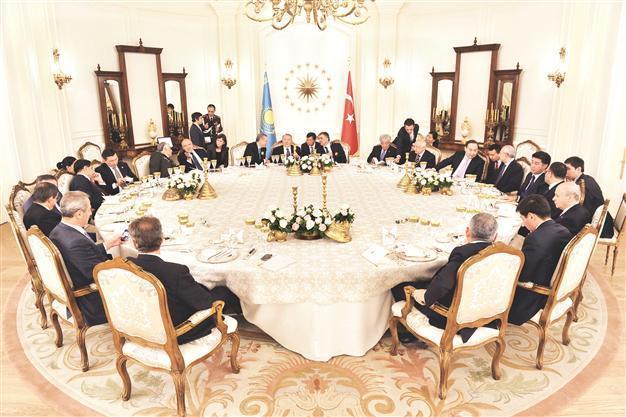Turkey, Kazakhstan pledge to enhance bilateral ties
ANKARA

CHP leader Kemal Kılıçdaroğlu and MHP leader Devlet Bahçeli were present at the President’s dinner in honor of Nazarbayev. DHA photo
The presidents of Turkey and Kazakhstan have voiced their determination to improve bilateral relations between the two countries in the political, economic, defense and cultural fields.President Abdullah Gül on Sept. 11 hosted a dinner in honor of his Kazakh counterpart, Nursultan Nazarbayev, at the presidential Çankaya Palace. Before the dinner, Nazarbayev decorated Gül with the Order of the “Altyn Kyran” (Golden Eagle), Kazakhstan’s highest state award.
Voicing dissatisfaction with the current trade volume between Turkey and Kazakhstan, which stands at $4 billion, Gül said the two countries will work together to increase this figure to $10 billion. “The New Synergy Action Plan, which was signed today, will accelerate our economic and commercial relations in the future,” he said. Nazarbayev said improving relations and ties is a common goal for the two countries. “The agreements we have reached and the documents we have signed favor both countries. I have full confidence that relations between Kazakhstan and Turkey will now progress at a new level,” he said.
BDP not among invitees
Parliament Speaker Cemil Çiçek, Prime Minister Recep Tayyip Erdoğan and Chief of General Staff Gen. Necdet Özel were among those invited to attend the dinner at the Çankaya Palace. Although main opposition Republican People’s Party (CHP) leader Kemal Kılıçdaroğlu and Nationalist Movement Party (MHP) leader Devlet Bahçeli were present at the dinner, neither of the two co-chairs of the Peace and Democracy Party (BDP) were in attendance. There was no official statement from Gül’s office, but Turkish newspapers cited anonymous sources as saying that Gül did not invite the BDP leaders in reaction to the BDP’s stance on the ongoing fight against the outlawed Kurdistan Workers’ Party (PKK).
On Oct. 1, in an address to Parliament at the start of the new legislative year, Gül had implied that he was against lifting the parliamentary immunity of nine BDP lawmakers who were seen embracing and warmly chatting with PKK militants near Şemdinli in the southeastern province of Hakkari in August.
Nonetheless, the president sent a clear message to the BDP lawmakers that embracing PKK militants was unacceptable: “There is no democracy on the face of the earth that tolerates embracing, extolling or legitimizing terrorism.”
















